On 9 March, 2024, Chungreng Koren — a mixed martial arts (MMA) fighter from Manipur also known as ‘The Indian Rhino’ — took his first step into the limelight at the Noida Indoor Stadium.
Competing in the co-main event of (MFN-14), India’s biggest MMA promotion, Chungreng Koren took on veteran fighter Mohammed Farhad in a five-round fight for the (Interim) Bantamweight Title (61 kg). As the fighters made their respective walk-ins to the octagon, the 16,000-strong crowd at the Noida Indoor Stadium cheered in anticipation.
What followed was a dominant performance by Chungreng who took the veteran fighter down at will with his relentless wrestling and then struck him with a barrage of ground-and-pound strikes till the referee intervened at the end of Round 4. Following the fight, with the belt wrapped around his shoulder, he made an appeal to the Indian Prime Minister to restore peace in Manipur, which is currently facing ethnic violence.
While his heartfelt appeal went viral, the moment also marked Chungreng’s emergence as one of India’s standout MMA fighters. When asked about the moment when he won the title, Chungreng says that he has no words to explain that feeling.
“Brother, I worked so hard and overcame so much to be here now. Now, I feel like I’m finding my way in this sport. Although this win is a turning point in my life, I’m only getting started. When I recently went back home, I was so happy and surprised to see people greet me at the airport. My village came out to celebrate my success. Watching all this really warmed my heart. Now, I’m back in Delhi-NCR to help my teammates at Warrior’s Cove prepare for their fights,” says the fighter from the Koireng tribe.
The Koireng tribe is one of the 33 officially recognised indigenous communities of Manipur.
Chungreng’s journey from crushing poverty to MFN champion is remarkable. It’s a story of resolve, fortitude, perseverance, determination and will—all hallmarks of a real fighter.
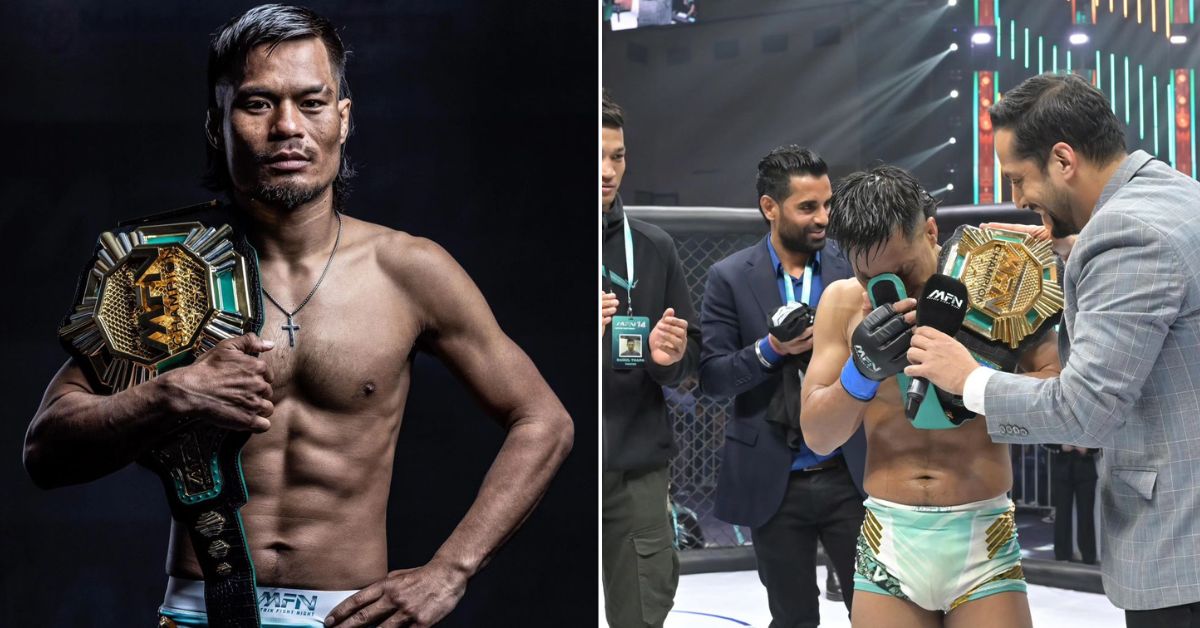
When Chungreng Koren became (Interim) MFN Bantamweight Champion
From Kamu Koireng village in Kangpokpi district, Manipur, which lies about 35 km away from Imphal, the state capital, Chunregeng Koren grew up as the youngest of four children.
“My father died when my mother was pregnant with me. She had to take on the responsibility of raising my two brothers, sister and me. There were few livelihood opportunities in my village except for farming and labour work. Whatever we grew on our land, including rice, cucumbers and pumpkins, we sold them at a local market in Imphal. We would walk 4 km and catch the bus to Imphal. It was very difficult for her but she was determined to feed us,” she adds.
Fortunately, there was an elderly lady at the market, probably a vegetable wholesaler or trader, who regularly saw Neisem (Chungreng’s mother) at the market and heard about how she was struggling financially. Barely a young boy at the time, he remembers what happens next.
“One day, when we came to the market, that elderly lady approached my mother saying that her daughter was a wrestling coach at the Special Areas Games (SAG) centre run by the Sports Authority of India (SAI) in the Khuman Lampak area of Imphal,” he recalls.
“During their conversation, my mother talked about losing her husband and the financial struggles at home. My mother also said that she had three sons, and if her [elderly lady’s] daughter could coach one of them, she would be very grateful. Soon, a wrestling coach visited our home, took a look at me and agreed to coach me. I started when I was about 12 or 13 at the SAG centre in Khuman Lampak,” he adds.
After struggling for a year, he developed a good understanding of wrestling and began competing in different age groups representing Manipur in regional tournaments. Chungreng aimed to one day represent India in the Olympics. Meanwhile, his mother was working in the fields back home, barely earning Rs 150 to Rs 200 a day, and his elder brothers found work operating JCBs far away up in the hills. Education was a luxury they couldn’t afford.
“I didn’t have money to come back home and visit my family. I didn’t even have money to travel for tournaments. There were times I would borrow money from my friends with a promise to return it. Despite getting selected to compete in national tournaments, I didn’t have the money to travel. I remember juniors training with me, would talk behind my back saying that I was poor. I had aspirations of and despite progressing well, poverty came in the way. Whenever I think of these times, I start to cry,” he recalls with tears flowing down.
After wrestling for a couple of years, Chungreng decided that his time was better-spent farming, working as a farm hand on rice fields and supporting the family. By the middle of 2012, he decided to quit wrestling altogether, fell in love, got married, and went back home. About a year and a half later, his first child was born, and life seemed destined to go in a certain direction.
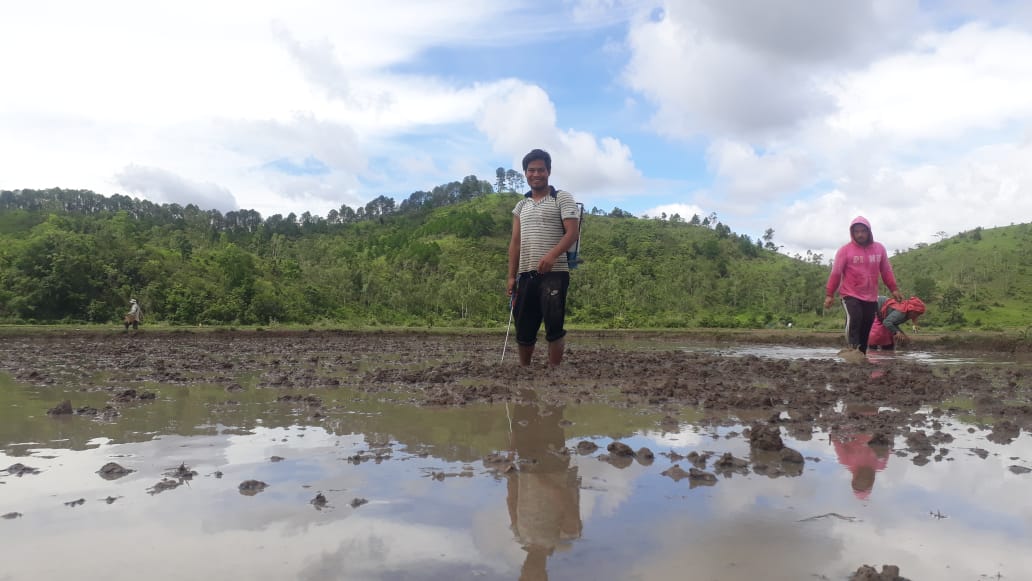
Chungreng Koren laboured in the rice fields of Manipur
“One night, however, out of nowhere, a different kind of feeling struck me. At night, I would suddenly get the urge to do push-ups and other exercises. When my wife asked me what happened, I told her that I had a deep desire to compete in sports. Despite our financial situation, I couldn’t give up the urge to compete and it was bothering me a lot,” he recalls.
This went on for about two months until he had no choice but to confide in his mother as well. Chungreng told her that he wanted to practise wrestling again and compete.
“I wanted to do more with my life. In response, my mother said that since I had a wife and a child, how would I support them with no money coming in from wrestling? My mother also said that she was growing old and needed help running the household. This back and forth went on for a year until I told my mother that if I didn’t go back to wrestling, I would lose my mind and that I wanted my child to play sports and have a chance at a better life,” he notes.
This changed his mother’s mind a little, but eventually, it was a local pastor who convinced her to let him train again with the belief that it would amount to something better. In 2016, Chungreng came back to wrestling. To help chase his dream, his mother worked even harder, sold whatever she could grow, and found work in Imphal. The four of them (Chungreng, his mother, wife and child) moved to a one-room residence near the Khuman Lampak area. While he was training in the morning, he worked as a construction labourer in the afternoon and evening.
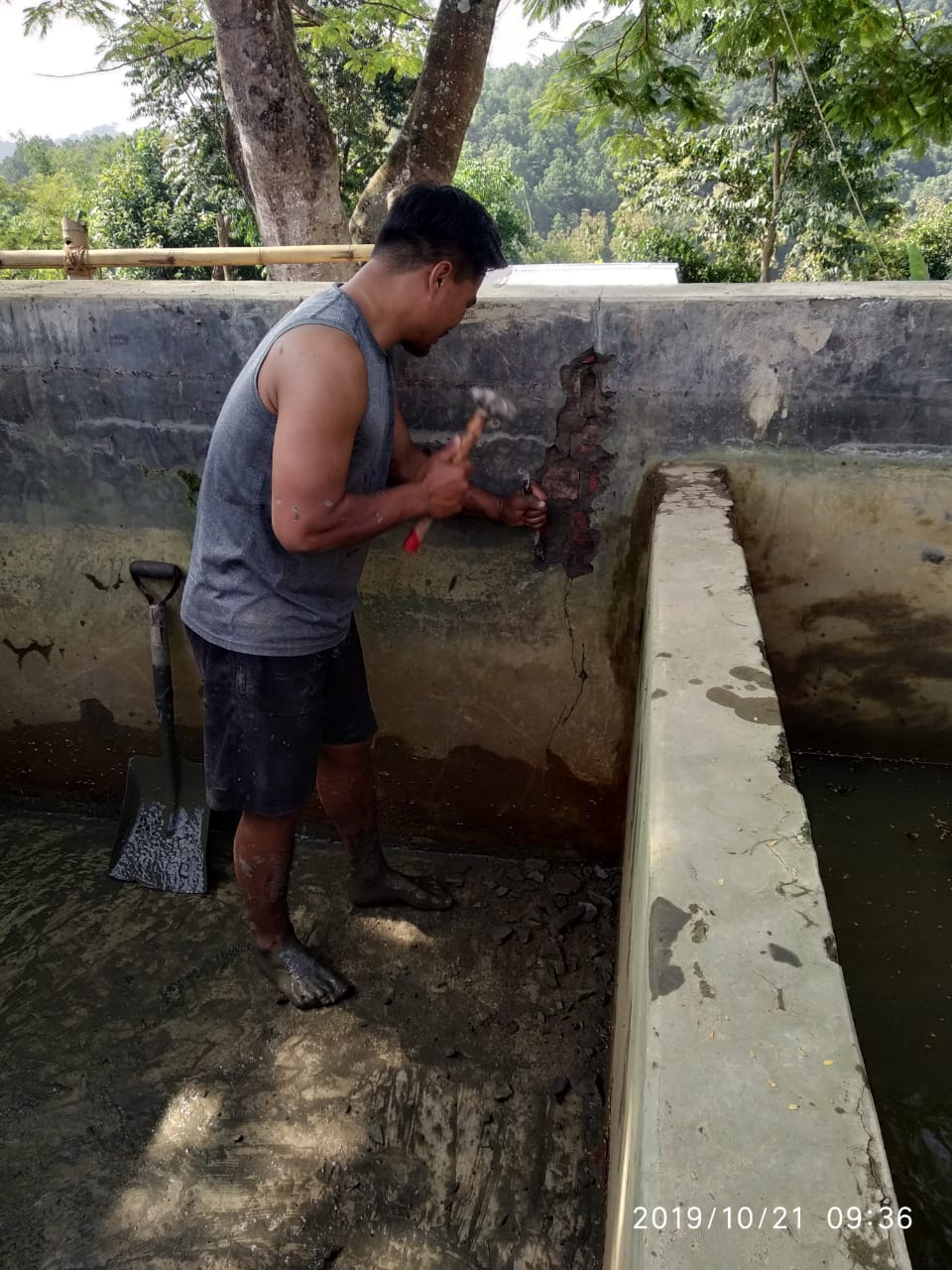
Chungreng Koren worked in construction to support his dreams
After training for nearly two years, he qualified for the National Games competing in the men’s 72 kg category. “To sponsor my travel and training, my mother went back to our village and collected money by asking everyone to contribute whatever amount they could,” he says.
While the National Games were slated to be held in Goa in November 2017, Chungreng decided to train at the SAI facility in Rohtak, Haryana. For a month before the event, he trained well but the event was postponed with no date in sight of when it was going to happen. It was a devastating blow. The next National Games would only take place in Gujarat in 2022.
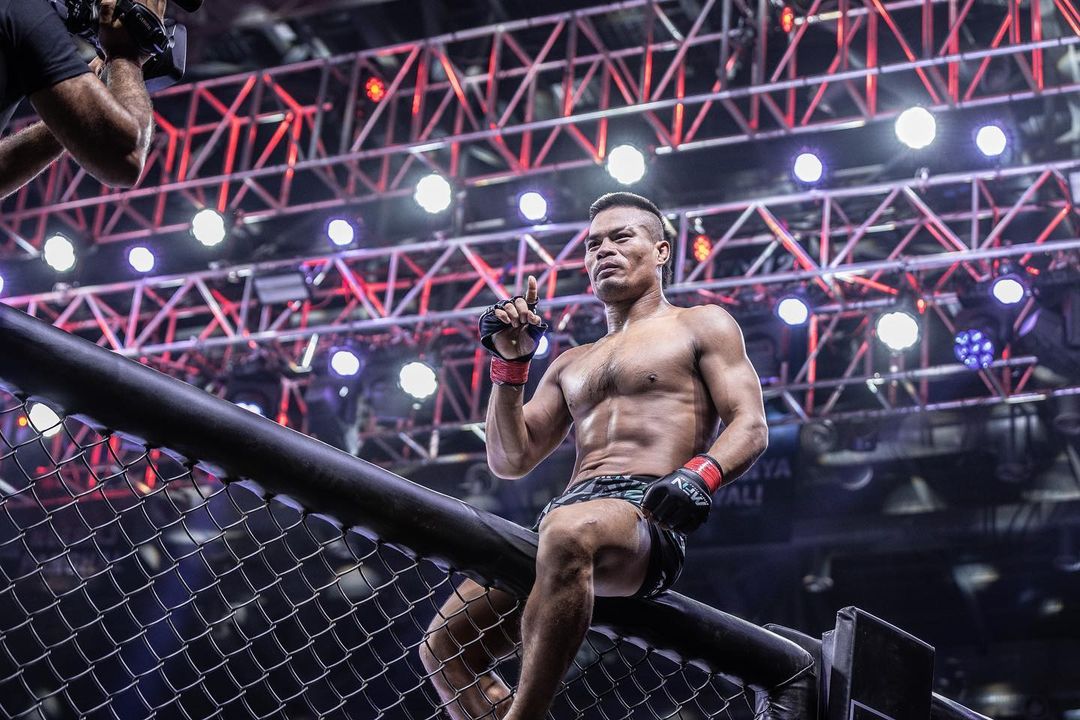
Chungreng Koren overcame so much in life to become one of India’s standout MMA fighters
With his wrestling career not going anywhere, Chungreng decided to call Roshan Mainam, an MMA fighter from Manipur and an acquaintance from his first stint in wrestling. Following the National Games debacle, Chungreng told Roshan that he wanted to train and compete in MMA because there was nothing else left for him. At this time, Roshan was trying out for Evolve MMA, a renowned Singapore-based gym, which produces fighters for ONE Championship — Asia’s most recognised MMA promotion — and other major promotions from around the world.
Speaking to The Better India, Roshan recalls, “We first met sometime in 2006 at junior wrestling tournaments in Manipur although he was competing in a higher weight category. By 2018, as I was getting recognised for MMA in the Northeast, he saw the potential of making the switch from wrestling. After seeing the recognition I was getting, we got in touch.”
“Following some success in the sport, my financial situation started to get better. In November 2018, I was selected to train at the prestigious Evolve MMA gym in Singapore. But a couple of months earlier, while I was training at Koi Combat Academy in Bengaluru, I invited Chungreng to come down and train there. Initially, I took care of all his expenses to train at the academy because he was not in a good place financially,” he adds.
“Roshan invited me to train at Koi Combat Academy and trained me for about two months before leaving for Singapore, following which Vishal [Seigell] Sir took over,” recalls Chungreng.
Following his selection to Evolve MMA, Roshan signed a $48,000-a-year contract for three years in which he would train full-time and compete in ONE Championship.
“Even when I was training in Singapore, I was helping fighters like Chungreng who were struggling financially. The reason why I support fighters like him is because I come from similar circumstances. I grew up as a sickly child in a poor family with a chronically sick father and a mother who worked extremely hard at a rice mill,” says Roshan.
“I also didn’t have money to train when I first moved to Delhi to train in MMA, and thankfully had coaches there who supported me similarly. So, I promised to myself that if I ever earned any notoriety in the sport, I would help other fighters after me from Manipur,” he adds.
Despite whatever support Roshan could offer, it wasn’t enough and Chungreng was still struggling to make ends meet. When COVID-19 struck, Chungreng left Bengaluru and his MMA dreams were hanging in the balance. But during the brief lull after the first wave, Roshan opened a gym in Imphal called RMX Mixed Martial Arts & Fitness where he took in Chungreng as a coach.
Nonetheless, the time spent training in Bengaluru would also allow him to take on 23 amateur fights (all wins) and his first professional fight at the Warriors Fighting Championship (WFC), a local promotion, in January 2020. It was a valuable experience.
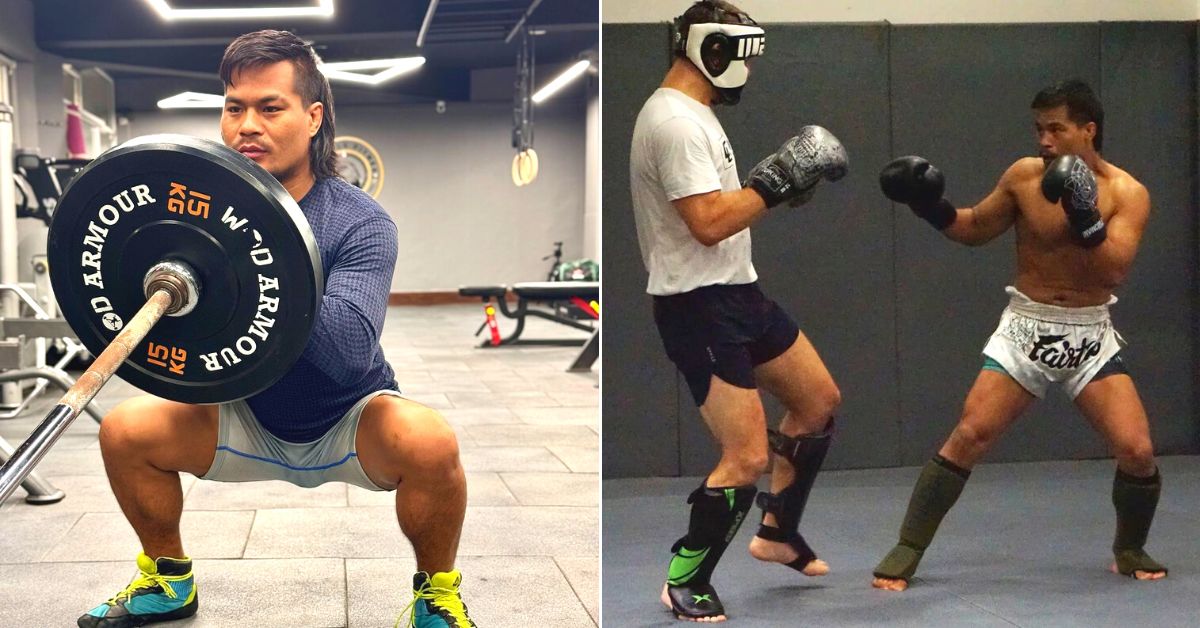
Chungreng Koren exhibits an intense desire to train and compete
Coaching and training at RMX, however, wasn’t giving Chungreng what he needed to grow in the sport. What’s more, his eldest brother died in 2020 following a tragic accident which left him with more responsibility to support his family. While this job as a coach gave him an income he sorely needed, it took a toll on his MMA career. And that realisation dawned on him after his first professional loss in December 2021 to Uttarakhand’s Angad Bisht at MFN-7.
“See, I took this fight on short notice without a training camp. All I did before this fight was run, sweat and make weight. I took this fight because I needed the money to pay back interest on a loan my family had taken. After losing the fight, however, I contemplated suicide. My wrestling career fell apart before it could start and I had just suffered my first loss in MMA. Losing this fight really forced me to introspect. While Roshan was training in Singapore, there was no one I could train with in Manipur who could take my game to the next level. So, I conveyed this message to Roshan and said I needed to train outside Manipur,” he recalls.
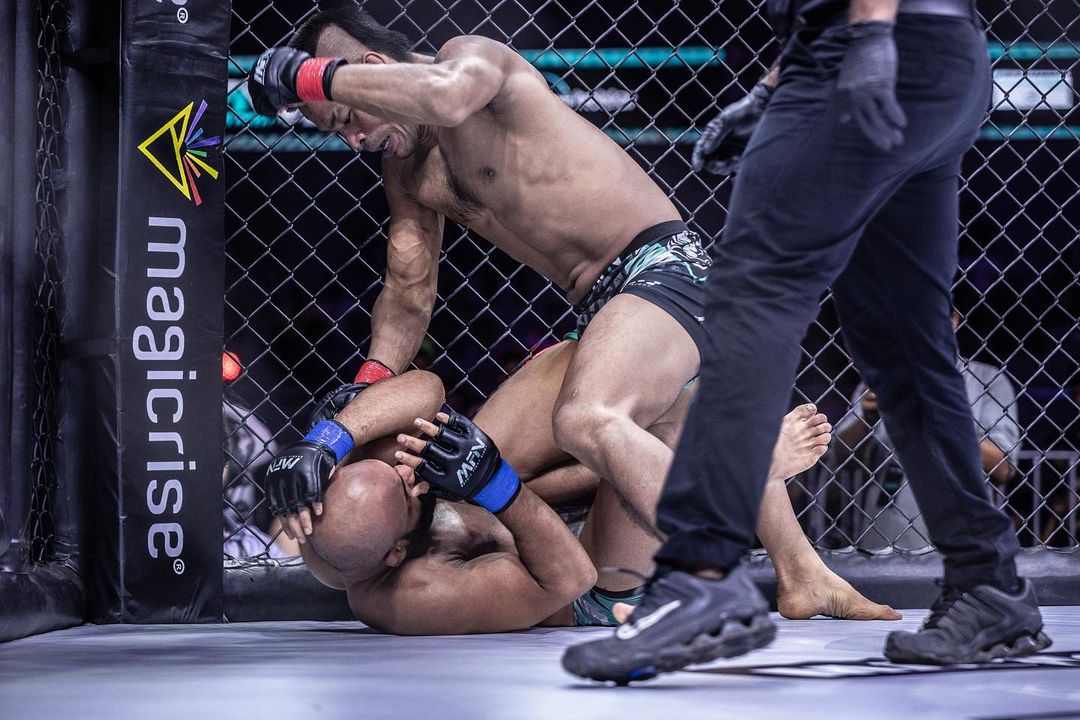
Chungreng Koren competing at an MFN event
After this conversation, Chungreng got a call from a fellow fighter whom he had met earlier in Bengaluru, and heard that there was a gym there that wanted to recruit fighters. He was told that the gym there would take care of all his living expenses. So, he came back to Bengaluru once again and began training.
This second stint in Bengaluru would change Chungreng’s life.
“Here, I met Coach Ashwin Hoon of Warrior’s Cove MMA, a gym based out of Gurugram, who was there for a seminar. I loved the way he was teaching us and the techniques he was showing us, but more than that, he was just a very good person. I knew that if I trained under him, I would improve. He was the coach I was looking for all this time. I didn’t care about dropping the sponsorship I was getting in Bengaluru. So, I spoke to Ashwin Sir and made my way to Delhi-NCR to train at Warrior’s Cove MMA,” he recalls.
Since Ashwin became his coach, Chungreng hasn’t lost a single fight. He’s currently on a four-fight win streak and holds a professional record of 6-1 (six wins and one loss).
“Today, things are a lot more stable financially with my MMA career on the rise while also working as a coach at this gym with close to 50 students. For years, I felt like I was carrying a 1,000 kg load on my shoulders worrying about how I was going to make it in life, make it as a professional fighter, and how am I going to support my family. Now, I can at least breathe a little easier. My goal is to make it into the . For now, however, I’m looking to unify the MFN Bantamweight Belt and improve my game,” he says.
“Chungreng’s rapid ascent in MMA is largely down to his strong wrestling background. It’s a good thing that he’s an MFN champion, but he shouldn’t limit himself to this level. He needs to compete against better competition in bigger promotions like UFC, PFL, and ONE. Competing at that level requires a lot of hard work but Indian fighters need to show that they can compete against the best in the world and become champions,” says Roshan.

(Edited by Pranita Bhat; Images courtesy Chungreng Koren )
Competing in the co-main event of (MFN-14), India’s biggest MMA promotion, Chungreng Koren took on veteran fighter Mohammed Farhad in a five-round fight for the (Interim) Bantamweight Title (61 kg). As the fighters made their respective walk-ins to the octagon, the 16,000-strong crowd at the Noida Indoor Stadium cheered in anticipation.
What followed was a dominant performance by Chungreng who took the veteran fighter down at will with his relentless wrestling and then struck him with a barrage of ground-and-pound strikes till the referee intervened at the end of Round 4. Following the fight, with the belt wrapped around his shoulder, he made an appeal to the Indian Prime Minister to restore peace in Manipur, which is currently facing ethnic violence.
While his heartfelt appeal went viral, the moment also marked Chungreng’s emergence as one of India’s standout MMA fighters. When asked about the moment when he won the title, Chungreng says that he has no words to explain that feeling.
“Brother, I worked so hard and overcame so much to be here now. Now, I feel like I’m finding my way in this sport. Although this win is a turning point in my life, I’m only getting started. When I recently went back home, I was so happy and surprised to see people greet me at the airport. My village came out to celebrate my success. Watching all this really warmed my heart. Now, I’m back in Delhi-NCR to help my teammates at Warrior’s Cove prepare for their fights,” says the fighter from the Koireng tribe.
The Koireng tribe is one of the 33 officially recognised indigenous communities of Manipur.
Chungreng’s journey from crushing poverty to MFN champion is remarkable. It’s a story of resolve, fortitude, perseverance, determination and will—all hallmarks of a real fighter.

When Chungreng Koren became (Interim) MFN Bantamweight Champion
Finding a way out
From Kamu Koireng village in Kangpokpi district, Manipur, which lies about 35 km away from Imphal, the state capital, Chunregeng Koren grew up as the youngest of four children.
“My father died when my mother was pregnant with me. She had to take on the responsibility of raising my two brothers, sister and me. There were few livelihood opportunities in my village except for farming and labour work. Whatever we grew on our land, including rice, cucumbers and pumpkins, we sold them at a local market in Imphal. We would walk 4 km and catch the bus to Imphal. It was very difficult for her but she was determined to feed us,” she adds.
Fortunately, there was an elderly lady at the market, probably a vegetable wholesaler or trader, who regularly saw Neisem (Chungreng’s mother) at the market and heard about how she was struggling financially. Barely a young boy at the time, he remembers what happens next.
“One day, when we came to the market, that elderly lady approached my mother saying that her daughter was a wrestling coach at the Special Areas Games (SAG) centre run by the Sports Authority of India (SAI) in the Khuman Lampak area of Imphal,” he recalls.
“During their conversation, my mother talked about losing her husband and the financial struggles at home. My mother also said that she had three sons, and if her [elderly lady’s] daughter could coach one of them, she would be very grateful. Soon, a wrestling coach visited our home, took a look at me and agreed to coach me. I started when I was about 12 or 13 at the SAG centre in Khuman Lampak,” he adds.
After struggling for a year, he developed a good understanding of wrestling and began competing in different age groups representing Manipur in regional tournaments. Chungreng aimed to one day represent India in the Olympics. Meanwhile, his mother was working in the fields back home, barely earning Rs 150 to Rs 200 a day, and his elder brothers found work operating JCBs far away up in the hills. Education was a luxury they couldn’t afford.
“I didn’t have money to come back home and visit my family. I didn’t even have money to travel for tournaments. There were times I would borrow money from my friends with a promise to return it. Despite getting selected to compete in national tournaments, I didn’t have the money to travel. I remember juniors training with me, would talk behind my back saying that I was poor. I had aspirations of and despite progressing well, poverty came in the way. Whenever I think of these times, I start to cry,” he recalls with tears flowing down.
After wrestling for a couple of years, Chungreng decided that his time was better-spent farming, working as a farm hand on rice fields and supporting the family. By the middle of 2012, he decided to quit wrestling altogether, fell in love, got married, and went back home. About a year and a half later, his first child was born, and life seemed destined to go in a certain direction.

Chungreng Koren laboured in the rice fields of Manipur
“One night, however, out of nowhere, a different kind of feeling struck me. At night, I would suddenly get the urge to do push-ups and other exercises. When my wife asked me what happened, I told her that I had a deep desire to compete in sports. Despite our financial situation, I couldn’t give up the urge to compete and it was bothering me a lot,” he recalls.
This went on for about two months until he had no choice but to confide in his mother as well. Chungreng told her that he wanted to practise wrestling again and compete.
“I wanted to do more with my life. In response, my mother said that since I had a wife and a child, how would I support them with no money coming in from wrestling? My mother also said that she was growing old and needed help running the household. This back and forth went on for a year until I told my mother that if I didn’t go back to wrestling, I would lose my mind and that I wanted my child to play sports and have a chance at a better life,” he notes.
This changed his mother’s mind a little, but eventually, it was a local pastor who convinced her to let him train again with the belief that it would amount to something better. In 2016, Chungreng came back to wrestling. To help chase his dream, his mother worked even harder, sold whatever she could grow, and found work in Imphal. The four of them (Chungreng, his mother, wife and child) moved to a one-room residence near the Khuman Lampak area. While he was training in the morning, he worked as a construction labourer in the afternoon and evening.

Chungreng Koren worked in construction to support his dreams
After training for nearly two years, he qualified for the National Games competing in the men’s 72 kg category. “To sponsor my travel and training, my mother went back to our village and collected money by asking everyone to contribute whatever amount they could,” he says.
While the National Games were slated to be held in Goa in November 2017, Chungreng decided to train at the SAI facility in Rohtak, Haryana. For a month before the event, he trained well but the event was postponed with no date in sight of when it was going to happen. It was a devastating blow. The next National Games would only take place in Gujarat in 2022.

Chungreng Koren overcame so much in life to become one of India’s standout MMA fighters
MMA calling
With his wrestling career not going anywhere, Chungreng decided to call Roshan Mainam, an MMA fighter from Manipur and an acquaintance from his first stint in wrestling. Following the National Games debacle, Chungreng told Roshan that he wanted to train and compete in MMA because there was nothing else left for him. At this time, Roshan was trying out for Evolve MMA, a renowned Singapore-based gym, which produces fighters for ONE Championship — Asia’s most recognised MMA promotion — and other major promotions from around the world.
Speaking to The Better India, Roshan recalls, “We first met sometime in 2006 at junior wrestling tournaments in Manipur although he was competing in a higher weight category. By 2018, as I was getting recognised for MMA in the Northeast, he saw the potential of making the switch from wrestling. After seeing the recognition I was getting, we got in touch.”
“Following some success in the sport, my financial situation started to get better. In November 2018, I was selected to train at the prestigious Evolve MMA gym in Singapore. But a couple of months earlier, while I was training at Koi Combat Academy in Bengaluru, I invited Chungreng to come down and train there. Initially, I took care of all his expenses to train at the academy because he was not in a good place financially,” he adds.
“Roshan invited me to train at Koi Combat Academy and trained me for about two months before leaving for Singapore, following which Vishal [Seigell] Sir took over,” recalls Chungreng.
Following his selection to Evolve MMA, Roshan signed a $48,000-a-year contract for three years in which he would train full-time and compete in ONE Championship.
“Even when I was training in Singapore, I was helping fighters like Chungreng who were struggling financially. The reason why I support fighters like him is because I come from similar circumstances. I grew up as a sickly child in a poor family with a chronically sick father and a mother who worked extremely hard at a rice mill,” says Roshan.
“I also didn’t have money to train when I first moved to Delhi to train in MMA, and thankfully had coaches there who supported me similarly. So, I promised to myself that if I ever earned any notoriety in the sport, I would help other fighters after me from Manipur,” he adds.
Despite whatever support Roshan could offer, it wasn’t enough and Chungreng was still struggling to make ends meet. When COVID-19 struck, Chungreng left Bengaluru and his MMA dreams were hanging in the balance. But during the brief lull after the first wave, Roshan opened a gym in Imphal called RMX Mixed Martial Arts & Fitness where he took in Chungreng as a coach.
Nonetheless, the time spent training in Bengaluru would also allow him to take on 23 amateur fights (all wins) and his first professional fight at the Warriors Fighting Championship (WFC), a local promotion, in January 2020. It was a valuable experience.

Chungreng Koren exhibits an intense desire to train and compete
First loss and redemption
Coaching and training at RMX, however, wasn’t giving Chungreng what he needed to grow in the sport. What’s more, his eldest brother died in 2020 following a tragic accident which left him with more responsibility to support his family. While this job as a coach gave him an income he sorely needed, it took a toll on his MMA career. And that realisation dawned on him after his first professional loss in December 2021 to Uttarakhand’s Angad Bisht at MFN-7.
“See, I took this fight on short notice without a training camp. All I did before this fight was run, sweat and make weight. I took this fight because I needed the money to pay back interest on a loan my family had taken. After losing the fight, however, I contemplated suicide. My wrestling career fell apart before it could start and I had just suffered my first loss in MMA. Losing this fight really forced me to introspect. While Roshan was training in Singapore, there was no one I could train with in Manipur who could take my game to the next level. So, I conveyed this message to Roshan and said I needed to train outside Manipur,” he recalls.

Chungreng Koren competing at an MFN event
After this conversation, Chungreng got a call from a fellow fighter whom he had met earlier in Bengaluru, and heard that there was a gym there that wanted to recruit fighters. He was told that the gym there would take care of all his living expenses. So, he came back to Bengaluru once again and began training.
This second stint in Bengaluru would change Chungreng’s life.
“Here, I met Coach Ashwin Hoon of Warrior’s Cove MMA, a gym based out of Gurugram, who was there for a seminar. I loved the way he was teaching us and the techniques he was showing us, but more than that, he was just a very good person. I knew that if I trained under him, I would improve. He was the coach I was looking for all this time. I didn’t care about dropping the sponsorship I was getting in Bengaluru. So, I spoke to Ashwin Sir and made my way to Delhi-NCR to train at Warrior’s Cove MMA,” he recalls.
Since Ashwin became his coach, Chungreng hasn’t lost a single fight. He’s currently on a four-fight win streak and holds a professional record of 6-1 (six wins and one loss).
“Today, things are a lot more stable financially with my MMA career on the rise while also working as a coach at this gym with close to 50 students. For years, I felt like I was carrying a 1,000 kg load on my shoulders worrying about how I was going to make it in life, make it as a professional fighter, and how am I going to support my family. Now, I can at least breathe a little easier. My goal is to make it into the . For now, however, I’m looking to unify the MFN Bantamweight Belt and improve my game,” he says.
“Chungreng’s rapid ascent in MMA is largely down to his strong wrestling background. It’s a good thing that he’s an MFN champion, but he shouldn’t limit himself to this level. He needs to compete against better competition in bigger promotions like UFC, PFL, and ONE. Competing at that level requires a lot of hard work but Indian fighters need to show that they can compete against the best in the world and become champions,” says Roshan.

(Edited by Pranita Bhat; Images courtesy Chungreng Koren )
